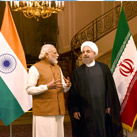Nuclear
The Political Factor in Nuclear Retaliation
That a nuclear taboo exists indicates the divide between conventional and nuclear war. It is no wonder then that India – though a nuclear weapons power – deems nuclear weapons not for military use but for deterrence purposes. These are, therefore, taken as political weapons. Seeking to deter use of nuclear weapons against India or its forces anywhere, India's nuclear doctrine promises ‘massive’ punitive retaliatory strike in case of nuclear use by its enemy. This is evidence that the Indian leadership is cognizant of the special status of nuclear weapons.
- Ali Ahmed
- March 2010
Convergence of Strategic Interests between India and Japan
The Joint Statement catapulted India-Japan strategic and global partnership to a “New Stage” in which the bilateral relationship is going to be deepened on all fronts, embracing regional, global and economic issues.
- Rajaram Panda
- January 07, 2010
Shadow over the Latest Nuclear Deal with Iran
The draft deal is envisaged as a test of Iran’s intentions, and from the Iranian point of view as a test of Western countries’ assurance to facilitate its peaceful nuclear programme.
- M. Mahtab Alam Rizvi
- November 05, 2009
Pakistan’s HEU-based Nuclear Weapons Programme and Nuclear Terrorism: A Reality Check
In order to construct an operational nuclear device, terrorists need to obtain the requisite fissile materials - Highly Enriched Uranium (HEU) or plutonium. It has been proved that, generally, it is much simpler to devise a crude nuclear bomb with HEU than with plutonium. Hence, terrorists can have 'reasonable confidence' in the performance of weapons-grade HEU bombs. The magnitude of the threat of nuclear terrorism from Pakistan's HEU-based nuclear weapons programme is assuming alarming proportions. However, adequate preventive steps can be taken to minimize the danger.
- Reshmi Kazi
- November 2009
Japan’s Nuclear Future
In the aftermath of North Korea's second nuclear test and the launch of three short-range missiles on May 25, 2009, followed by the launch of seven ballistic missiles into the Sea of Japan on July 4, there has been widespread speculation on Japan's principled position on non-proliferation and disarmament and whether it will abandon its nuclear abstinence and acquire nuclear capability. This possibility has been echoed recently by the US Secretary of State Hillary Clinton and Defense Secretary Robert Gates.
- Reshmi Kazi
- November 2009
Obama and Nuclear Disarmament: Drivers and Substance
Obama is the first American president to actively pursue the goal of nuclear disarmament. But roadblocks on the road to disarmament nirvana, as envisaged by Obama, remain.
- S. Samuel C. Rajiv
- October 08, 2009
North Korea Admits to Uranium Enrichment Programme
Indications are that the stalled six-party talks on the North Korean nuclear issue will resume in the coming months. While North Korea has let it be known that it is willing to return to the negotiating table, the United States showed its willingness to hold one-to-one talks with North Korea. This time, the North Korean capability/status of uranium enrichment programme would, among other things, dominate the negotiations.
- Ch. Viyyanna Sastry
- September 23, 2009
Re-visioning the Nuclear Command Authority
In a new book Nuclear Strategy: India’s March Towards a Credible Deterrent, Dr. Manpreet Sethi has recommended a restructuring of India’s Nuclear Command Authority. Since India’s nuclear doctrine is premised on ‘Assured Retaliation’, nuclear retaliatory attacks can only be authorised by the civilian political leadership through the Nuclear Command Authority. Presently, the Nuclear Command Authority, as approved by the Cabinet Committee on Security on 04 January 2003, stipulates:
- Ali Ahmed
- September 09, 2009
The Nuclear Agenda of the Obama Administration
After eight years of governance by a Republican Administration, the United States elected a Democrat as its president. The Democrat President, Barack Hussein Obama, assumed presidency and appointed several key officials to implement his agenda. Though some believe that democracy forces political parties to evolve a common agenda and towards consensus on several key issues, there are others who see differences between the Republican agenda and those of Democrats.
- Rajiv Nayan
- September 2009








